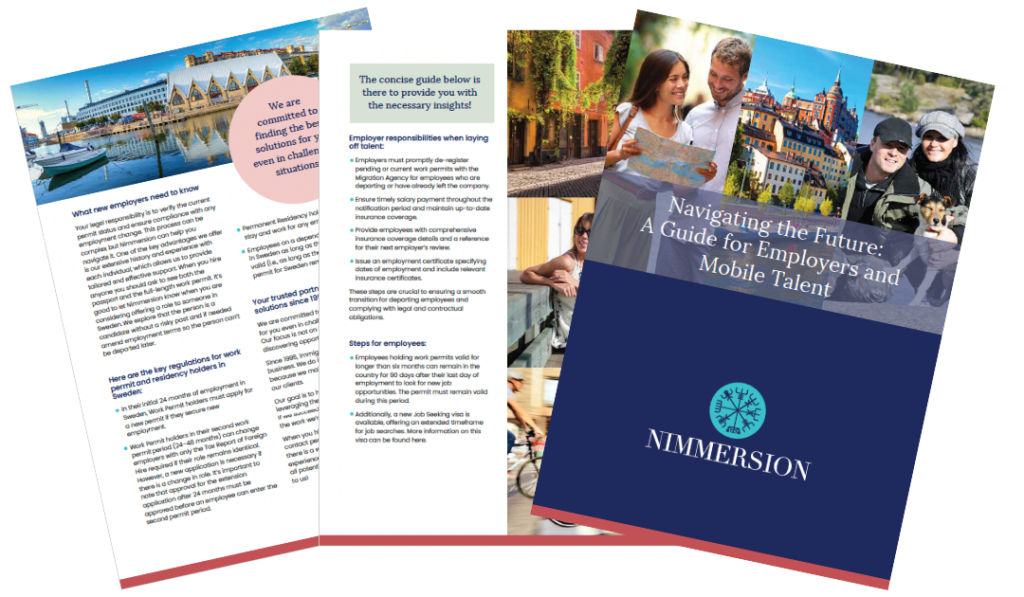
Photo by Tove Freij / http://mediabank.visitstockholm.com/
Frequently, Swedish we hear that HR departments worry about how to create successful work permits for their new recruits. There is a way to do this with minimal amounts of stress, but you need to know the rules and follow them precisely . Below we will explain how.
This is more often the case with small to medium-sized businesses, who are unaware of the dedicated services that can help with this complicated and time-consuming part of the recruitment process, and guidance with the stringent requirements of advertising, salary and insurances required for each work permit. These minute details can mean the difference between their new hire starting their new position, or not starting at all.
A small clerical error can end with an eviction. Will it be my fault?
Obtaining a work permit in Sweden isn’t easy: it is a multi-step process. The first step, which is to create the Offer of Employment with the Migration Agency, provides the first opportunity for employers to ‘slip up’ and make costly mistakes that may tack on months to their recruitment process. Below we have compiled a short description of some of the major pitfalls that are easily avoided when you have the right insights and knowledge.
ADVERTISE THE POSITION CORRECTLY
When it comes to creating a work permit, ensuring that you advertise the position in the correct way is crucial. To understand why, it is important that we first differentiate between our normal hiring practices and fulfilling the requirements of Swedish immigration law.
Small to medium-sized businesses use a variety of different methods to fulfil their recruitment needs. Many businesses use LinkedIn, referrals, and even finder’s fee bonuses to staff for recommendations. For most HR departments, it is not about how the advertisement is posted, but rather who fills the role. This approach needs to be complemented with an administrative approach when it comes to hiring a foreign national. It is all about jumping through the right administrative hoops.
Accordingly, any position filled by a third country national (i.e., not Swedish, and not an EEA/EU-citizen) must be posted so that it is available to all applicants from within the EU. The Migration Agency provides to different options: first, advertising through the Arbetsförmedlingen, and second through the European job mobility portal known as EURES. Advertising on Arbetsförmedlingen is by far the most popular with Swedish employers. The advertisement, regardless of which portal it ends up on, must be advertised for 10 days – not one minute shorter! Furthermore, don’t forget to save a copy of the “annons ID”, which is crucial for providing proof to the Migration Agency that the advertisement has been published.
In order to understand why Swedish employers are required to advertise in such a manner, and change our own internal practices, we need to understand the overall implications of the rule. Unionsföreträdet, or preference of European citizens, is a fundamental element of the European Union’s free movement of labour. Change your mindset: when it comes to hiring third country foreign nationals, it’s not just about finding the right person, but following the right process.
SALARY AND TRADE UNION OPINION:
A key procedural formality for all work permits is the procurement of a “trade union opinion”. The trade union opinion, which is the Swedish equivalent to a labour market test, provides the relevant trade union the opportunity to comment on the terms of employment of the third country national.
But why is this important, and how does it relate to your business? Unless your business has signed up for a Collective Agreement, it won’t be able to show the Immigration Authorities that the terms of employment offered are equal or better than those terms provided through Collective Agreement (or industry practice).
Trade Unions not obliged to provide an opinion to a company who has not signed a collective agreement with them. In such cases, where a union official declined to provide comment on salary offered, Migrationsverket will rely solely on median salary statistics for that occupation according to the Statistiska Centralbyrån. Some unions are willing to comment on employment terms, but they are the exception to the rule and are few and far between.
The current debate is whether unions should be obligated to offer their opinion on salary terms even for non-members. An alternative offered to them is to publicize the agreements publicly, so all have access to the data. Until that happens each offer must be sent to a union to allow them to have an opinion on the terms.
OFFER THE PROPER INSURANCES
Insurances have been a point of contention for those business hiring third country nationals in recent years. Again, it is important to differentiate Swedish and European hires from those hailing from outside the EU. While the former is accountable to general Swedish labour law, the latter is accountable to both labour laws, as well as immigration regulatory frameworks.
This is a frequent point of friction as this is where immigration demands may demand a higher or better compensation package than what is available to local hires. This is particularly the case regarding insurance and pension plans.
A common mistake is only offering comprehensive pension and insurance plans after the lapsing of the third country nationals probationary period (provanställning). This is, seemingly, the norm with many companies for local hires, yet it is a dangerous practice when dealing with foreign talent and their work permits. This is because in order to fulfil the requirements of a Swedish work permit, the foreign worker must have been covered by the required insurances from day one. This simple misunderstanding is the most common reason of rejection of permit and so called kompetensutvisningar. As you can imagine, a permit rejection can cause an enormous strain on both HR and the employee in terms both long term and short term. It can disrupt ongoing projects, as well as take multiple months to register and complete the appeals process.
While the Migration Agency leans on the government to ease on some of the requirements we are not yet fully there with allowing minor mistakes and looking at the big picture. The ABB eviction in 2018 was a testament that the more lenient approach that should have replaced the hardcore practice isn’t fully in place. Companies will be able to correct some oversights before they send in the renewal application which is why we very often do Visa exploration cases as pre-assessments in order to catch any slip ups before filing.

Photo by Henrik Trygg / http://mediabank.visitstockholm.com/
CONCLUSION
Initially, the process can seem straightforward. By contrast, it is in fact a process that hinges entirely upon minute details and procedural accuracy. Small mistakes in procedure can cause massive consequence on that upcoming transaction, newly tendered project, as well as the employee’s life.
Swedish recruiters have had an uphill battle in recent years to entice prospective talented recruits as many are wary of taking a new position in Sweden due to the horror stories they have heard in the last 4 years. HR has been taking on the second step in the recruitment phase and found themselves in the line of fire with a huge problem on their hands. Not surprisingly, it’s a big burden to bear for HR who have full responsibility for the accuracy that not only are the terms all fulfilled, but the application and terms should stand the test of time and still be perfect in two years when the renewal is due.
Here are some more articles that might be of interest on the subject of Swedish Immigration
How to safely bring your new hire to Sweden
Why HR should encourage work permit holders to get the residence card before entry to Sweden
The top 2 questions employers ask about Swedish Immigration
Want to know more about the immigration process, and the advantages of having an immigration partner to support you in the recruitment process? Download our guide here:
For more information on immigration to sweden, go to our Immigration Guide guide on our website which contains loads of articles and helpful information.
Download our guide for employers and mobile talent

We have created an essential guide to help you navigate relocation and immigration processes with ease. The guide will provide you with insights concerning employer responsibilities, requirements and work permit regulations.

